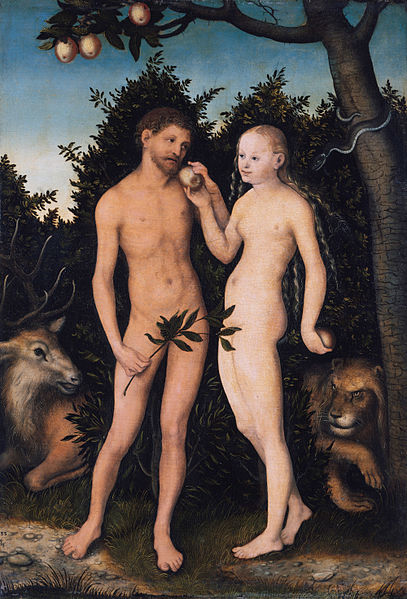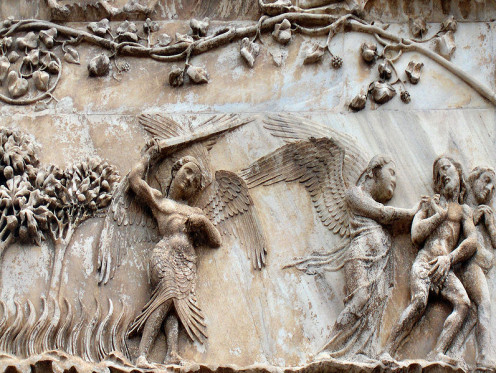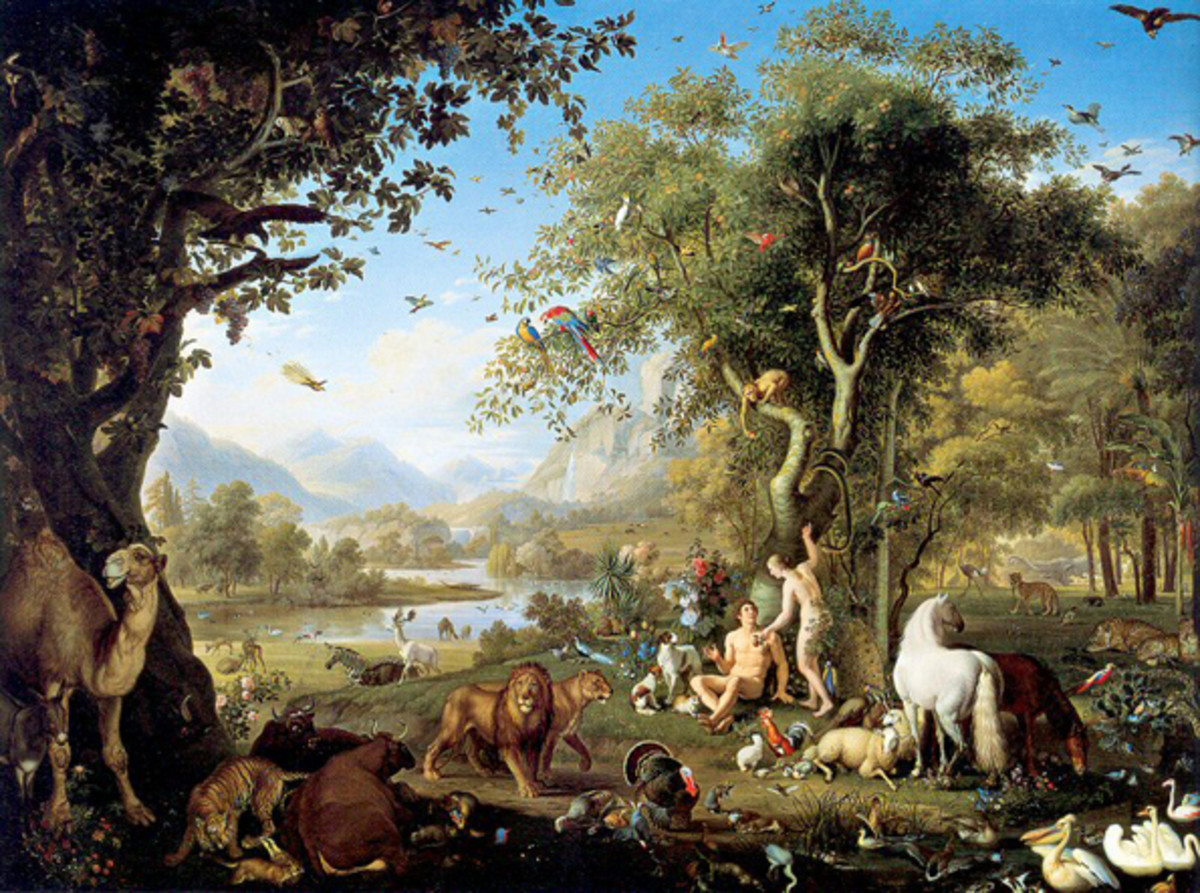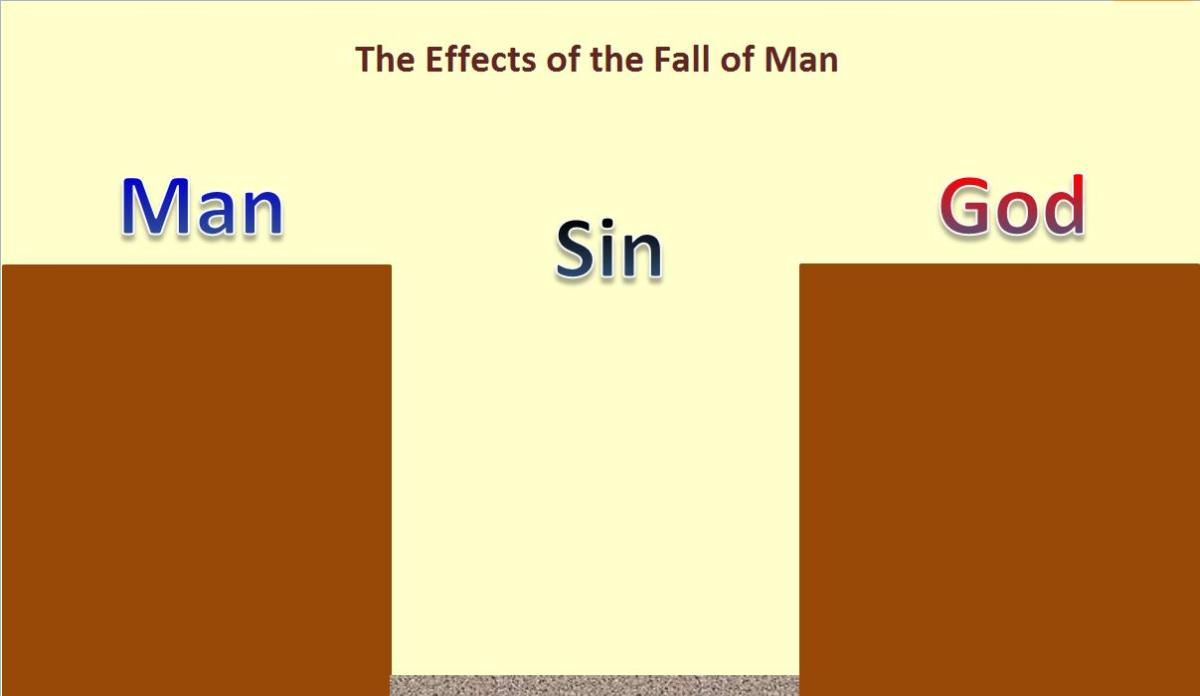Bible: What Does Genesis 3 Teach Us About The Temptation, Fall, and Banishment of Mankind?
Our First Parents

The Temptation, Fall, and Banishment of Mankind
Genesis 3
The Serpent Tempts Eve
Enter the serpent. A creation of God, it possesses verbal communication abilities and intellectual craftiness (v. 1a).
[To this point in the narrative, the text has given no indication that any other “beast of the field” had verbal skills. Secondly, why would a creature that had no need to catch prey require cunning? (See 1:30). Of course, the reader does not learn until later that Satan has commandeered this creature’s body to execute his plan].
One day the serpent engages the woman--not the man-- in conversation, and proceeds to twist her thinking regarding God’s benevolence by indirectly questioning His single prohibition (v. 1b; cf. 2 Cor. 11:2; 1 Tim. 2:14). [How soon after Man’s creation did the serpent beguile Eve?]
Her response betrays innocence (she detects no deceit from the serpent), truthfulness (she does “correct” the serpent’s misapprehension), and circumspection (she displays true fear of disobeying God) [vv. 2-3].
[Spoken to Adam, God’s original prohibition regarding the forbidden fruit did not include “Do not even touch it.” Perhaps when Adam told Eve about this warning, he tacked on this extra prohibition as what he saw as a wise precaution. (Yet is it wise or even permitted to add to God’s word? Would such a being [pronounced “very good” as part of the original creation] have the freedom to do so? Did these extra words complicate matters?) Either this conjecture on the writer’s part explains how the addition came about, or else Eve invented the additional command on her own. Still another perspective is that God did command every word that Eve told the serpent, but He did not direct Moses to record them. These possible explanations, of course, constitute arguments from silence].
The serpent contradicts God’s commandment, thereby ascribing stinginess and lack of generosity to Him; it says, in essence, “God is knowingly withholding wonderful benefits from you, because He does not want you to enjoy all that life has to offer” (vv. 4-5). The deceptive argument gradually works its way into Eve’s soul, causing her to stare curiously at the apparently healthy fruit and say to herself, “Nothing looks bad about this fruit.”
Next, she admires the tree’s dimensions, color, etc., and comments, “The tree is beautiful to behold.” Lastly, she desires to acquire the forbidden “wisdom” that eating the fruit would afford her, saying, “I want to have knowledge like God’s; it’s not right for Him to keep it from me” [v. 6a; cf. 1 John 2:16]. Disobeying God by eating the fruit and convincing Adam to eat it also produce one of the effects the serpent mentioned: the decision “opens their eyes” (vv. 6b-7a).
[Much remains to speculation here. Was Adam immediately with her, or did she seek him out? If he was with her, why did he not step in and stop the serpent’s ploy? Fully aware of the horrific consequences (that is, spiritual and physical death), why did Adam eat the fruit? Is his love for Eve a significant enough reason for him to sin against God? Apparently, Adam thought it was.
The fruit had no magical qualities; that is to say, eating it per se did not cause them to “see,” any more than Delilah’s cutting off Samson’s hair per se caused him to lose his strength. After the pair ate, God separated Himself from them because they disobeyed; they died spiritually the moment they placed their will above His.
Likewise, God “left” Samson because the latter broke the vow he had made].
The Fall and Banishment of Adam and Eve

Adam and Eve
Do you believe Adam and Eve were historical figures?
The Fall and Banishment of Mankind
The Fall of Mankind Causes Relationship Difficulties
When they lose their spiritual communion with God, their relationship with each other also begins to suffer; this sin disrupts the intimacy and innocence that they knew in their “married” life.
They cover their loins, sewing fig leaves together (v. 7).
[They began to think impure sexual thoughts about each other; thus, they experience guilt and seek to cover up.]
[Shortly thereafter, Yahweh Elohim may have assumed visible form to seek out the pair, for the text says that He was “walking in the garden” (v. 8a)].
[The NKJV translates “voice” as “sound” to remain consistent with the LORD’s walking.
Adam apparently heard His voice and not simply “the sound of the LORD God walking”(v. 10).
He and Eve hid themselves when they first heard Him call, “Where are you?” (v. 8b).
Of course, God did not need Adam to shed light on the circumstances, for He knew exactly where they were located.
The LORD kept calling his name (v. 9), because He wanted Adam to reveal himself and confess his sin and fear.
Hearing this admission of guilt was His objective in searching for them (v. 10)].
Seeking full disclosure from His creation, God asks Adam rhetorical questions (v. 11).
Instead of accepting responsibility for his personal sin, however, the man blames Eve directly (and God indirectly) for causing the disobedient choice (v. 12).
When the LORD confronts Eve, she “passes the buck” to the serpent, having learned well from her partner the art of blame shifting (v. 13)!
Yahweh's Judgments Upon the Serpent, the Woman, and the Man
Rendering judgment upon the guiltiest party first, Yahweh Elohim curses the serpent with a three-fold imprecation in this protoevangelium:
(1) Serving a permanent symbol of Satan's degradation, the physical creature suffers punishment (“on your belly you shall go, and you shall eat dust all the days of your life”) [v. 14];
(2) The woman (and thus women in general?) will hate snakes (v. 15a);
(3) Spiritually speaking, Satan and his “seed” (unregenerate humanity?; cf. John 8:44) will hate her seed (believers)/"Seed” (the Messiah Jesus), but only succeed in “bruising His heel” (v. 15c).
Messiah, however, will destroy the serpent one day (“bruise your head”) (v. 15b).
[Would not “crush” be a better description of what Messiah would do to the serpent’s head?]
Next, God levels two acts of chastening against the woman:
(1) Not only will she experience horrible labor pains, but she may also need to endure the loss of children (v. 16a); and
(2) she will greatly desire to have her husband’s role of headship, but will not receive it. Instead, she must become subservient to him (v. 16b).
Finally, the LORD punishes Adam’s weakness and disobedience by cursing the ground.
Yet even this action, He says, is “for your sake” (v. 17b; cf. Rom. 8:20-22).
[How does this curse upon nature benefit mankind (“for your sake”)?]
Adam’s rigorous, daily labors in the fields will bring forth dubious production from them; this frustration will continue until he dies physically (vv. 18-19).
Disaster Through Disobedience
view quiz statisticsDeath
Physical Death Occurs For the First Time in History
At this juncture Adam names the woman Eve (“Living”), and God clothes them in skin tunics (vv. 20-21).
[Earlier, God brought the woman to Adam to see what he would call her.
Adam finally exercises his headship over Eve by naming her, and the LORD kills some of His beasts to provide suitable coverings for His special couple.
The deaths—the first times this horrible event occurs—may prefigure the need for an innocent sacrifice/Sacrifice to shed its/His blood to atone for sins].
God Banishes Adam and Eve from the Garden of Eden
After reasoning occurs within the Triune Godhead—“The man has become like one of Us”—that allowing the man and his wife to remain in Eden would constitute an eternally precarious situation for them, the LORD decides to banish Adam and Eve from the garden (vv. 22-23).
[This reasoning process, of course, is for the reader’s benefit.
From eternity past, God knew what He would do with His disobedient children.
If our parents had eaten from the tree of life in their fallen state, they would have lived forever in that condition.
Exiling them from Paradise, placing cherubim to guard “East of Eden,” and positioning a flaming sword to prevent entrance to the now forbidden tree ensured their protection from that fate and opened up the way to future redemption (v. 24)].
© 2012 glynch1







